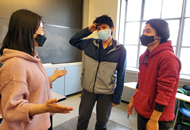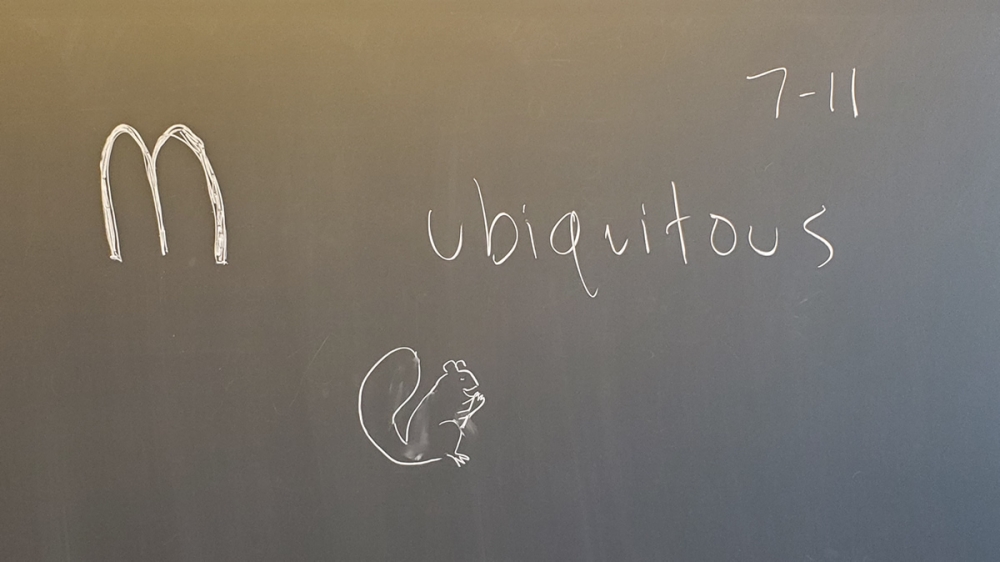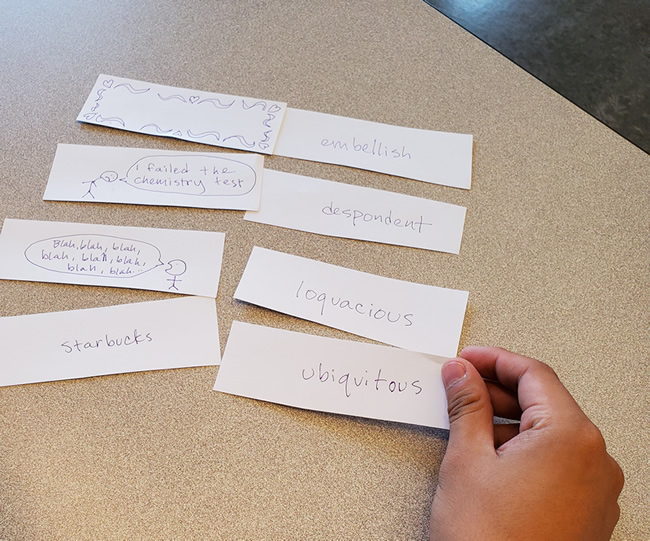|

We know that to succeed academically, multilingual learners
(MLLs) need to both understand and accurately use a rich, varied lexicon,
especially in writing. As Engber (1995) explains, the size and quality of
vocabulary is the strongest correlation to ratings of papers (based on a study
of texts written by intermediate second language writers).
Certainly, students can learn vocabulary passively
with flash cards and quizzes on definitions. However, this decontextualized
method is not enough to give students the confidence to produce these words.
But beyond flash cards, how can students master difficult words found on
academic vocabulary lists?
This article offers three focused activities to
help students better understand and use academic vocabulary: The Associations
Game, The Book of Records, and My Categories. Each offers a different way for
students to make a personal connection to the words while offering room for the
instructor to supervise and give feedback. I have chosen college-level words to
illustrate that these activities can be used with less frequent terms, but they
are flexible and will accommodate a wide range of word lists. All of these
activities can be adjusted for time by increasing or decreasing the size of the
word list or the number of examples required.
Activity
1: The Associations Game
The Associations Game is a review that helps
students engage with academic words through self- and peer-generated examples.
It is especially useful for more abstract terms and less frequently used words
that might not be encountered outside of the classroom.
Time: 40 minutes
Materials: Paper cut into
strips, scissors, and a different list of 10–15 words that students have
encountered before for each group. (Try to avoid words that are very similar in
meaning.)
Warm Up
Before distributing the paper slips, write a
familiar word on the board. Ask students what the word makes them think of. The
example they give can be a person, place, thing, situation, experience, or
feeling and can be expressed as an example: a word, phrase, sentence, or
picture. To encourage students to make personal connections, stress that this
should be an example, not a synonym or definition.
For instance, the simple word hot may conjure up pictures of the sun or fire for some
students. Others may imagine a “hot” actor or fashion trend. The more academic
word ubiquitous could elicit the example of Starbucks,
event posters in the hallways, or the squirrels that are everywhere on campus.
Write or draw their examples next to the word.
Clarify vague or ambiguous suggestions.

Sample Wordlist
|
affluent |
embellish |
malicious |
amorphous |
expiration |
|
collaborate |
detriment |
oblivious |
reek |
fritter |
|
terse |
surreptitious |
ubiquitous |
perplex |
dwindle |
How to Play
First, divide the students into an even number of
groups of with three to four students each and give each group a set of 10–15
blank strips of paper (one for each word). Students write the vocabulary words
on the left side of blank strips. They then put one example for each word on
the right side. Check student answers as they write them to ensure that their
examples are appropriate.

Click here to enlarge.
After the students have filled out as many strips
as they can within 20 minutes, they cut the completed ones in half with
scissors and mix up the papers. Any uncompleted strips are discarded. Each team
then exchanges their set with another group. The teams then try to re-create
the original combinations. After they have finished, someone from the team that
wrote the examples should check them.
Note: Set a timer for 20
minutes for the first part and call time for students to stop working, then
exchange the mixed-up sets of strips. Make it clear to students that they do
not need to finish all the words in the time allotted.
Activity
2: The Book of Records
The Book of Records is a game I initially devised
for students to practice comparative and superlative adjectives—and it is still
useful for that! However, whether students are still mastering that skill or
have gone beyond it, the Book of Records is a great way to practice using words
in a fun way.
The name of the game should be based on the name of
your school or program (e.g., “The Smith School Book of Records”). Because
students will vie to be a “winner” in their class, be sure to include
categories that a variety of students might win—whether that is a hobby or the
amount of homework they get every week.
Time: 30–40 minutes, depending
on the number and difficulty of questions
Materials: A list of questions
about superlative qualities that use vocabulary students know passively.
Warm Up
Start by writing a few superlative questions on the
board. For instance, “Who is the most versatile actor?” or “Which Olympic sport
is the most exciting?” As students suggest candidates, ask them to support
their answers with reasons.
How to Play
Break students up into groups of four or five. Each
group receives the same list of six to eight questions—each containing a
superlative. Students must give examples to support their claim to the record,
and records are determined by consensus. The type and number of questions will
determine the length of the exercise. For instance, “Who can tell the most
terrifying story?” will take a long time. “Who is the most dexterous?” will
take less time.
Once each group has determined its “record
holders,” those students will go on to compete for the class record in front of
the class. Final winners will be determined by the class.
Example Questions
- Who can say the English alphabet the most
rapidly?
- Who is the grouchiest when they wake up in the
morning?
- Whose favorite animal is the fluffiest?
- Who was the most sedentary this week?
- Who can tell the most hilarious joke?
- Whose day was the most hectic?
Activity
3: My Categories
Finally, My Categories is a great springboard to a
writing activity as well as a way to practice vocabulary. It is possible to
categorize words in many ways—groupings like “verbs,” “words from Latin,” or
“words to describe a person” can be useful—however, for this exercise, the idea
is for students to create categories that draw on their own experiences and
interests.
Time: 30 minutes
Materials: Blackboard and a
list of at least 25 words students know passively
Warm Up
After giving students the word list, write a
category of your own on the board. The category should be as specific as
possible and should be based on meanings. Begin to add
words and explain why each fits your category. Ask students for other words
from the list they think would fit your category and write these on the board
as well. Make sure that students understand there is no right answer.
Sample Wordlist
|
scanty |
sphere |
boast |
foible |
exhibit |
drizzle |
|
habitat |
clumsily |
isolated |
relaxed |
debate |
mammoth |
|
summon |
briskly |
drooping |
invisible |
adoringly |
bewildered |
|
author |
rage |
benefit |
shambles |
livelihood |
dominate |
|
mimic |
sweltering |
gruesome |
miniscule |
woe |
superficial |
Examples of Model Categories
“Words about my garden”
- Habitat—for insects
- Mammoth—the size of the sunflowers in
August
- Benefit—the flowers benefit butterflies
- Drooping—the flowers if they don’t have enough
water
“Words about my commute to school”
- Briskly—how I walk to the subway
station
- Woe—if I miss the train, I’ll be late to
work!
- Sweltering—the temperature on the subway in the
summer
How to Play
Students work in pairs to create three categories
of three to five words each from the list and write them on a paper or the
board. They should include their reasons for selecting each word. After they
finish, groups read their favorite examples to the class. As mentioned earlier,
this activity is a great lead-in to writing; students can expand on each list
to create a complete paragraph.
Conclusion
These are just a few of the ways you can give
students opportunities to practice academic vocabulary. As they move through
the semester, they build personal connections to items in their word lists,
helping them to thrive in their content classes.
Reference
Engber, C. A. (1995). The relationship of lexical
proficiency to the quality of ESL compositions. Journal of Second
Language Writing, 4(2), 139–155. https://doi.org/10.1016/1060-3743(95)90004-7
A. C. Kemp has been a lecturer in English language studies at MIT since 2007. She has a master’s degree in applied linguistics from the University of Massachusetts/Boston. A. C. has also presented extensively on teaching strategies for vocabulary acquisition. Since 2002, she has been the director of Slang City, a website devoted to American slang and colloquial language.
|